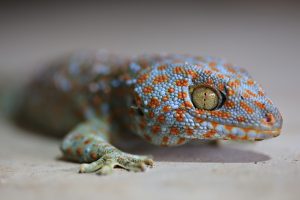In September of last year, the Thai Supreme Court made a ruling that systematically changed the precedent for illegal wildlife trade cases – not just for Thailand but for the Greater Mekong region as a whole.
Illicit wildlife trafficking is one of the most lucrative forms of illegal trade, estimated to be worth between $7 billion and $23 billion each year, and is often listed as the fourth-largest illegal trade after drugs, counterfeiting, and people.
The profile of wildlife crimes, however, remains relatively small in comparison to these other forms of illegal trade. This is possibly because the perceived victims are not human, enforcement is lax, and the political will to pursue meaningful sentences for apprehended criminals is low.
Often the people who are caught and penalized in the wildlife trade are the underlings of powerful and well-connected crime syndicates and kingpins who oversee vast smuggling networks. Some organizations have been building the capacity of wildlife enforcement agencies to conduct intelligence analysis to pursue these more influential wildlife traffickers. However, partially because the sentences for wildlife cases are often light and not commensurate with the crimes, it’s common practice for the most replaceable members of the wildlife trade chain to take the fall and then go back to being lower-level criminals.
Wildlife trafficking is therefore a low-risk, high-reward crime in which people sitting at the top of trafficking networks make huge amounts of money with little threat of being caught.
Every once in a while, a major wildlife case will make it to the courts. One such case was that of Bach “Boonchai” Mai, a Vietnamese national who had been implicated in a network that trafficked elephant ivory, rhino horn, and pangolins from Africa to Southeast Asia and China. Arrested by Thai police in January 2018 for his role in smuggling 14 rhino horns from Ethiopia into Thailand, the case against him fell through when a key witness changed their mind and refused to testify in court at the last minute. Boonchai walked free just over a year after his arrest.
While this outcome was enormously disappointing for conservationists and the enforcement officers involved in the case, it wasn’t a surprise. Even when they are finally taken into custody, wildlife trafficking kingpins rarely receive meaningful convictions. The impact of their crimes is sometimes difficult to quantify, given the broader ecosystem destruction and the ramifications of wildlife poaching and trafficking beyond the “market price” of the illegal items. Kingpins are often well connected and convicting them can be politically risky. And evidence needs to be thoroughly and carefully collected and analyzed, involving cooperation between multiple countries and sectors, in countries where the authorities tasked with fighting wildlife crimes are poorly resourced.
WWF and like-minded organizations have recognized this as a major challenge. Prosecutors and judges are not wildlife experts, let alone wildlife crime analysts. They don’t necessarily understand the impact that a network like Boonchai’s can have on the survival of the species that are being killed for the trade, on the species that live in the same ecosystem that is impacted by the sudden removal of megafauna, on the people who depend on that ecosystem, on national security and, on public health.
To fill this gap, WWF has been working with national and regional prosecutors and judicial officials to increase their understanding of the importance of building good wildlife crime cases and adjudicating them in a way that creates a sufficient deterrent for criminals. WWF has been advocating with the national supreme courts in the region, and has managed to sensitize key players to the importance of handing out sentences commensurate with the severity of the trafficking crime.
WWF also conducted wildlife crime training for prosecutors in Thailand and Laos, and in a training on January 2022 with the Thai Office of the Attorney General (OAG) and the Court of Justice, used the Boonchai case as a practical example of how far-reaching the impacts of this kind of criminal network can be. We also highlighted the crucial role that the prosecution plays in creating meaningful deterrents for wildlife traffickers.
Since the disappointing outcome of the Boonchai case in 2019, the OAG had appealed the case in multiple lower courts in the country. In 2022, they appealed the case in the Supreme Court, an important way to show how serious Thailand is about countering wildlife crime, even if a favorable outcome was unlikely. Even the act of bringing a wildlife crime case to the highest court would raise the profile of wildlife trafficking in the eyes of the judiciary and had the potential to inspire future prosecutors and judges.
In September of last year, the Supreme Court sentenced Boonchai to five years in prison. Although Boonchai is on the run, this ruling sets a new legal precedent for illegal wildlife trafficking cases in Thailand, with all other courts in the country now looking to this case as the standard going forward. It sends a clear message to wildlife criminal kingpins and networks that things have changed in the country and the region, and that wildlife trafficking can no longer be carried out with impunity, just because a well-connected individual threatens or bribes the right people.
For us, this rare, major and meaningful outcome has been a testament to how critical advocacy work, both by us and our partners, is to change the narrative that our region is a wildlife trafficking hotspot. Building on the momentum generated by this case, we will continue to raise the profile of wildlife crime in the region and use the precedent set in Thailand to make wildlife trafficking high-risk and low-reward.

































